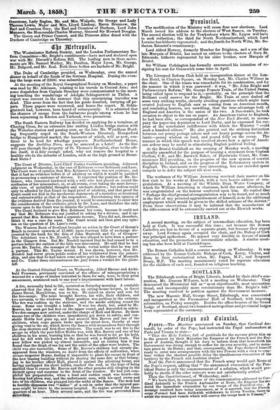Vruniurial.
The modification of the Ministry will cause four new elections. Lord March issued his address to the electors of West Sussex, on Tuesday. The second election will be for Tewkesbury where Mr. Lygon will have to seek reelection; the third for North Northumberland, which Lord Loraine has hitherto represented ; and the fourth for North Wilts, Mr. So- theron Esteourt's constituency.
Lord Alfred Hervey, formerly Member for Brighton, and a son of the late Marquis of Bristol, has issued an address to the electors of Bury St. Edmunds, hitherto represented by his elder brother, now Marquis of Bristol.
Sir William Codrington has formally announced his intention of re- signing his seat for Greenwich some time in April.
The Liverpool Reform Club held an inauguration dinner at the Lon- don Hotel, in Clayton Square, on Monday last, Mr. Charles Willmer in the chair. One of the toasts was remarkable for its combination, and for the manner in which it was answered : it was, " Mr. John Bright and Parliamentary Reform," Mr. George Francis Train, of the United States, being called upon to respond to it,—probably, on the principle that the Brilliant could answer for the Bright. Mr. Train at once dashed off some very striking truths, cleverly avoiding questions which might have created Jealousy to English ears as coming from an American mouth, and reminding hearers, not unwilling, that the true advantage both of England and America is the union of the two. A free-trader, he took occasion to object to the tax on paper. An American visitor to England, he had been able, as correspondent of the New York Herald, to accom- pany the paper-tax deputation to Lord Derby, and he expressed his sur- prise at the nonchalant indifference with which the Minister " could snub a hundred editors." He also pointed out the striking distinction between our penny postage ashore and our heavy postage across the At- lantic—penny wisdom on land, and pound folly on the ocean. The manner in which this speech was received shows how a spice of Ameri- can ardour may be useful in stimulating English political feeling.
At the Bristol Guildhall on the evening of Monday week, a meeting specially assembled for the purpose of hearing a statement from Captain Crofton, C.B., and Mr. Barwick Baker, of Hardwicke Court, Mr. Coal. missioner Hill presiding, on the progress of the new system of convict discipline in Ireland, and on the progress of the Reformatory system in England. The statements were very interesting, but our crowded space compels us to defer the subject till next week.
The workmen of Sir William Armstrong received their master on his first visit to his works at Elswick, with a very hearty address of con- gratulation. At a meeting of the Whittle Dean Water Company, of which Sir William Armstrong is chairman, held the same afternoon, he was congratulated on the honour conferred upon him. Ho replied that " Perhaps the chief ground of congratulation was to be found, not so much in the fact of any personal aggrandisement of himself, as in the additional employment which would be given to the skilled artisans of the district." From these observations it may be inferred that the manufacture of the rifle-cannon will be extensively carried out at the Elswick works.


























 Previous page
Previous page